After what seemed like a lull in 2022 and 2023, we can safely say that Indian startups are back. In fact, 2024 has proven to be more pivotal in the Indian startup journey than we anticipated.
With more than 6,500 stories published in the year, it was also a year where newsmakers such as founders, VCs, policymakers and startups themselves kept themselves in the limelight for the right and the wrong reasons.
Some such as Byju Raveendran were the obvious newsmakers — and obviously not for the right reasons — while those that grabbed the attention in 2023 flew under the radar in 2024.
But there was no shortage of people who actually drove the news cycle this year, kicking off debates that lasted more than a day on social media, and grabbing the headlines in the world’s third-largest startup ecosystem.
Bear in mind that these are the personalities that have come to the fore more routinely than others in 2024, and not about those that may have created controversies or unicorn founders or even founders of companies that listed publicly — those are topics that we will cover later in our 2024 In Review series.
Instead, we are shining the spotlight on the likes of Ola Electric’s outspoken CEO Bhavish Aggarwal who juggled three unicorns and took one to the IPO milestone all while also somehow having the time to enter into social media spats with critics.
Or Elon Musk, who had a wild ride — from making overtures to India with Tesla to stirring up debate with the Starlink and satcom spectrum and then of course playing a pivotal role in Donald Trump’s victory in the US presidential elections.
When it comes to the India story, nothing took home more headlines than quick commerce, and both Deepinder Goyal and Aadit Palicha were in the thick of it for Blinkit and Zepto.
And there were others too. So here’s Inc42’s annual list of newsmakers, starting with the Zepto founder.
Newsmakers Of The Year
Note: The below list is in alphabetical order, and is not meant to be a ranking. The personalities have been selected on Inc42’s editorial discretion
Aadit Palicha: Putting Zepto Under The Spotlight

Zepto was constantly in the limelight this year, and Aadit Palicha became the face of the quick commerce revolution. With over $1.3 Bn raised this year, Palicha proved that despite his young age, he is capable of leading a company that can attract globally and domestically.
All that fresh capital has perhaps put Zepto in a great spot against key rivals such as Blinkit and Swiggy Instamart, with Palicha also spelling out the vision to build a D-Mart-like behemoth, earlier this year .
Another major move for Zepto — literally — was transitioning from Mumbai to Bengaluru, as the company looked to battle Swiggy on its home turf. Having more or less set a playbook for its Mumbai operations over the course of the past three years, Zepto has now set its eyes on building a stronghold in Bengaluru, another key core market for quick commerce.
Next on the cards for Palicha and Zepto is the lucrative Zepto Cafe business, a way for the company to step into food delivery.
Alakh Pandey: The New Face Of Indian Edtech

It’s not been a great time for edtech or edtech founders at large, but Alakh Pandey bucked those trends not only as cofounder of PhysicsWallah but also through his public stance on some systemic issues.
From his support to students on alleged discrepancies in the NEET-UG 2024 test to filing a plea in the Supreme Court seeking a probe into these allegations, Pandey showed a different side of being an entrepreneur in the education space. Of course, it completely gelled with this persona of being a founder that connects with students directly.
Coming as it did on the back of new products and before a major fundraise for PW in the year, Pandey’s public display of supporting students made him the face of the edtech ecosystem this year, especially at a time when other founders stepped away from the limelight
Ashwini Vaishnaw: Leading India’s AI & Semiconductor Revolution
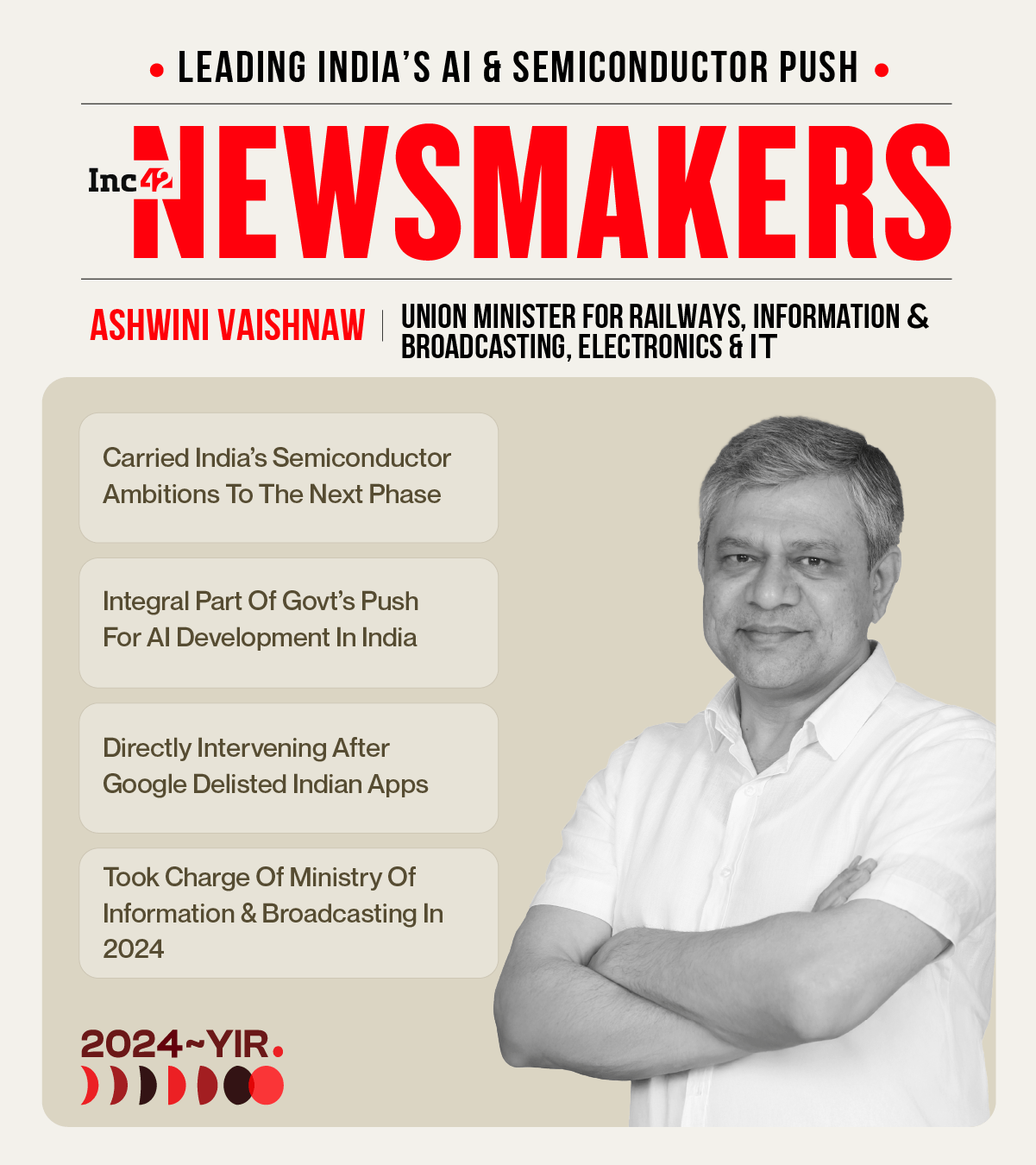
As the Union Minister of Electronics and Information Technology, Ashwini Vaishnaw is already one of the most important figures in the government for startups. And his work in creating the foundation for the government’s thrust on AI and semiconductors stood out this year.
Besides these major areas, Vaishnaw also undertook the startup’s inclusion in the digital public infrastructure-based approach for AI in India, as well as the India AI Mission, which is built on seven well-defined pillars, ensuring inclusivity and innovation in leveraging AI for national development.
The minister’s bullishness on AI also landed him a spot in the TIME Magazine’s 2024 list of the 100 most influential people globally in AI.
But for startups, the biggest contribution of 2024 perhaps was Vaishnaw’s intervention after Google Play delisted several dozens of Indian apps over billing policies. This definitely earned the IT minister quite a few fans among Indian startups, and added a new chapter in the big tech vs Indian startups debate.
Bhavish Aggarwal: Juggling Three Unicorns, An IPO & Social Media Spats
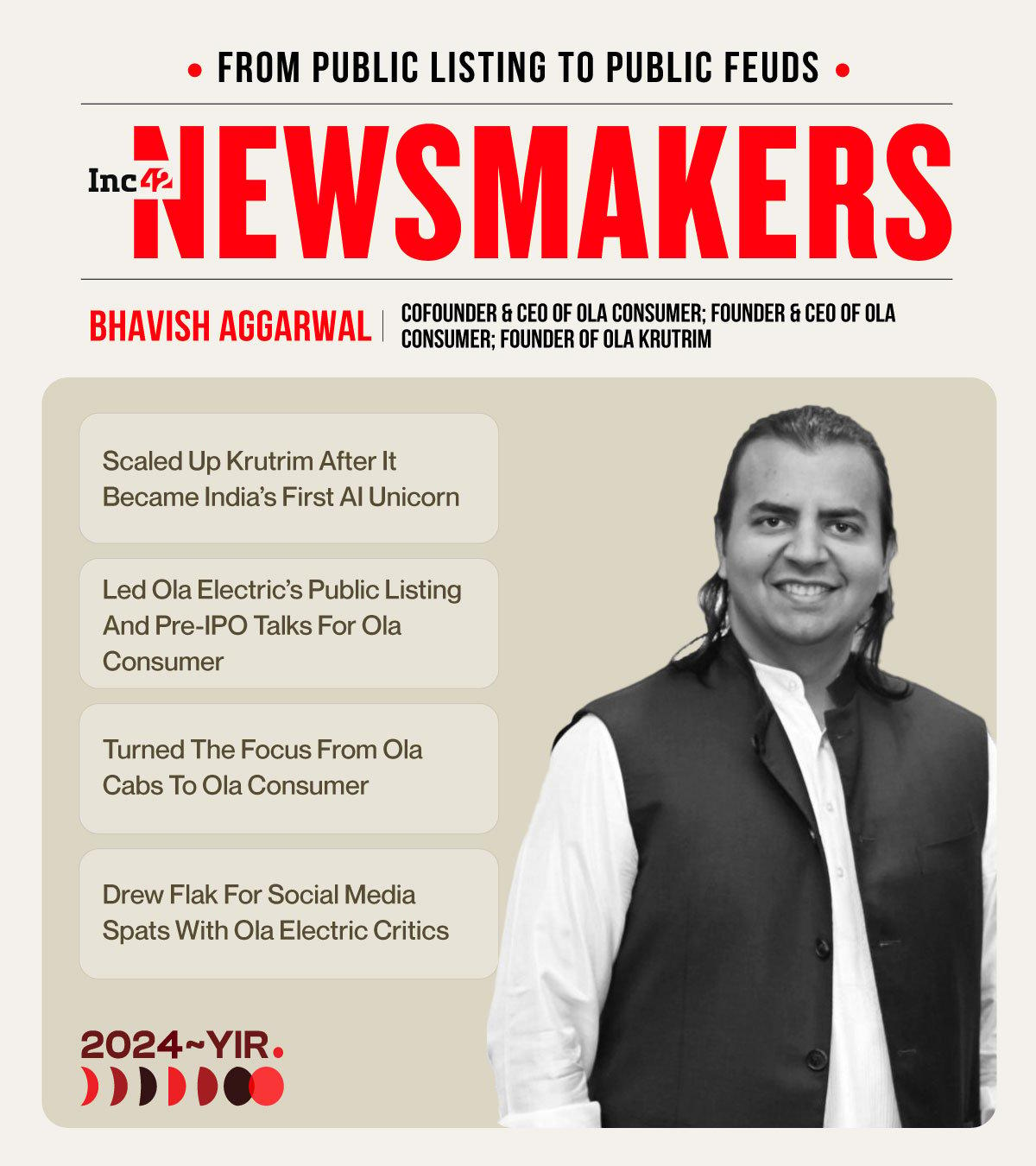
Ola Electric, Ola Consumer and Krutrim CEO Bhavish Aggarwal naturally had a lot on his plate this year, and we barely went by a week without his name in the news.
At the start of the year, Aggarwal parked the third unicorn in his stable of businesses after raising fresh funds for his AI startup, Krutrim, within months of inception. However, the hoopla around Krutrim was short-lived as India’s biggest EV company, and Aggarwal’s second unicorn, Ola Electric made it to the bourses.
However, Ola Electric’s ride hasn’t been exactly smooth in 2024. With rapid expansion plans in full throttle, the company ran into a severe after-sales servicing issue. The widespread criticism of Ola Electric was worsened when Aggarwal landed himself in a bit of trouble on social media when he directly took on critics.
Aggarwal also shifted the gears on his oldest business Ola Cabs, which is now Ola Consumer. As part of the rebranding, the company is also going to diversify beyond mobility to ecommerce, food delivery, quick commerce and other areas.
With another IPO on the horizon, Aggarwal might well find himself in this list next year too, especially if he continues to swing hard when questioned about Ola’s profitability and products.
Deepinder Goyal: Spearheading Zomato’s New Vision

Zomato became the first startup to get a spot in the BSE Sensex, food delivery continued its profitable run, Blinkit grew faster than ever before and District emerged from the labs at the Gurugram-based consumer services giant. And yes, there was the acquisition of Paytm Insider.
Deepinder Goyal rarely stepped away from the limelight this year, but makes it to our newsmakers list not just because of these major business developments at Zomato, but because of how he has become an extension of brand Zomato in many ways.
Even when Goyal ventured into the television arena with Shark Tank India in early 2024, his decision-making and attention to detail gave us many insights into how Zomato is run. And two separate incidents towards the end of the year only added to this image.
First, Goyal took on the role of a delivery partner for a day, highlighting the plight of gig workers to some extent, but also showing that he’s willing to be hands-on when it comes to studying his business.
The other one — a now-viral job post for the Chief of Staff at Zomato — indicated the exacting nature of working with Goyal and the Zomato leadership, and how Goyal is an influencer in his own right. No wonder then that a job that supposedly involved an INR 20 Lakh upfront payment got nearly 20,000 applications.
Elon Musk: Leading Tesla’s Tryst With India
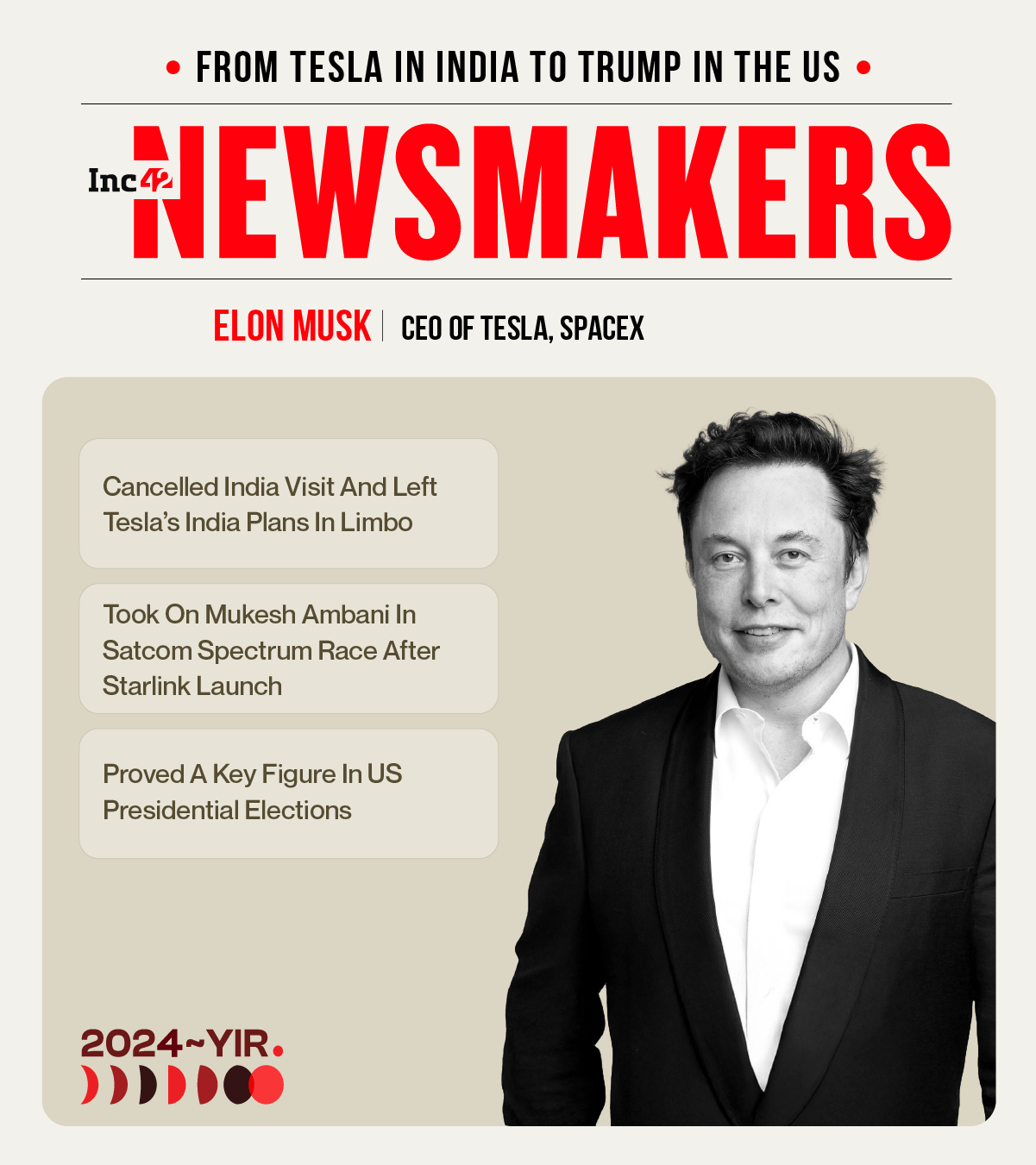
It’s hard to keep Elon Musk away from the limelight, he often commands it, but in the Indian context, Musk has previously just been a curious personality with little influence.
That changed with the acquisition of X for certain, but in 2024, Musk took a closer look at India than ever before.
Obviously, the electric vehicle opportunity with Tesla was big on Musk’s agenda for the planned India visit which he later cancelled. On the cusp of the visit, there was a lot of speculation on how Tesla will invest billions to set up plants in India.
But those plans are in limbo right now. More clarity was seen in Starlink’s plans for India. The satellite internet company made its foray into the market, but is battling the likes of Mukesh Ambani for spectrum rights to fully launch operations.
Beyond India, Musk’s pivotal role in Donald Trump’s return to the US White House has divided public opinion. But that’s just what we get with Musk — not just someone who is ready to be in the public spotlight, but willing to own it.
Mukesh Ambani: Guiding Reliance To The AI Age
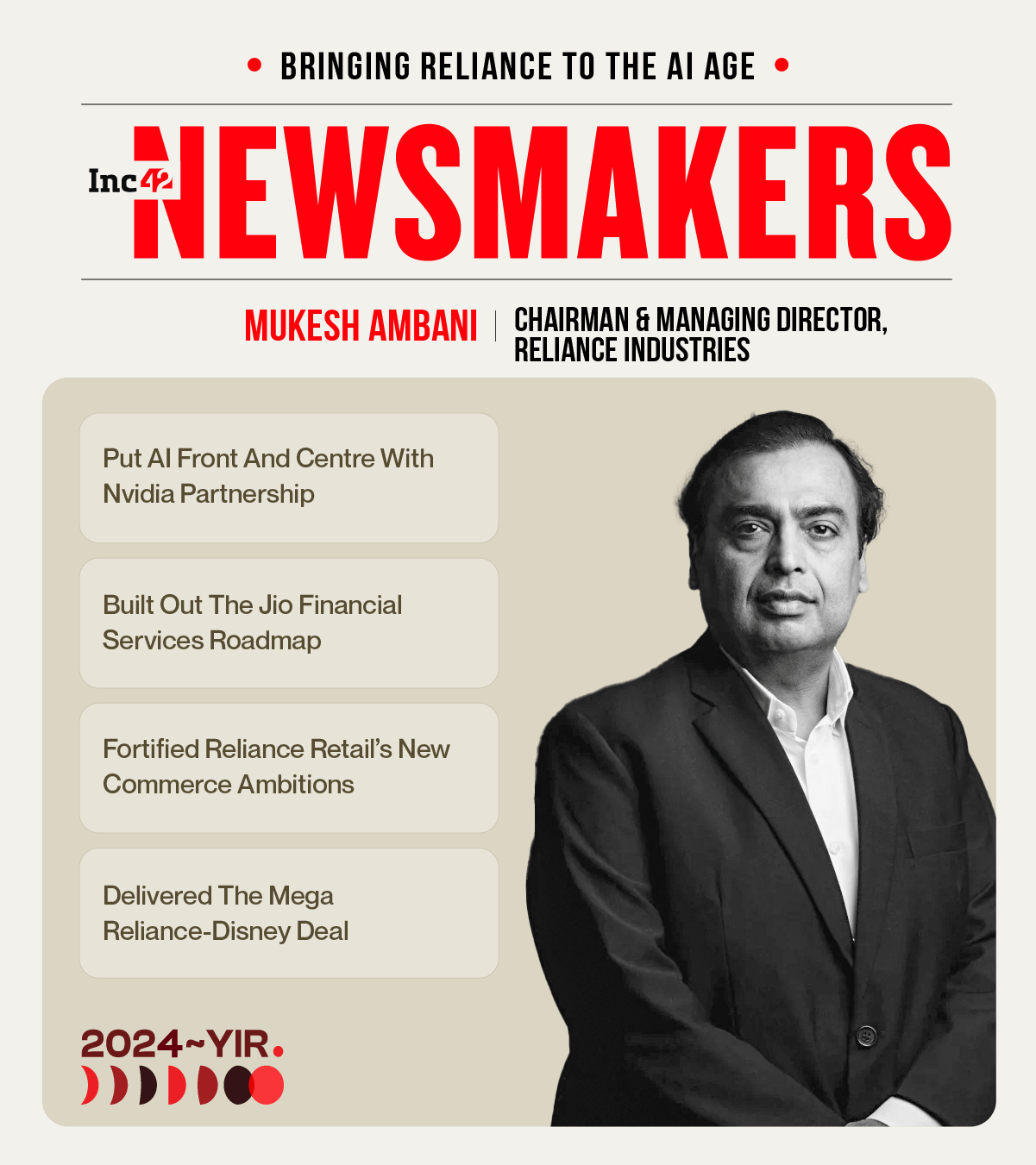
The majority of buzz around the Ambani family this year was for the grand wedding with celebrities from around the world, but when it comes to the business, Mukesh Ambani typified Reliance’s push for modernity.
For one, the RIL chief led the way at the Nvidia AI Summit in Mumbai with a fireside chat with Nvidia’s CEO Jensen Huang, where the two industry titans delved into the future of AI in India. In many ways, this sets the narrative for where AI is going in India, and how Reliance is looking to unlock value.
With AI as its north star this year, Reliance Jio launched a B2B product called Jio Brain to help enterprises integrate GenAI into their operations and products. The company has also launched Jio AI-Cloud and Jio Phone Call AI as value-added services for its subscribers built around GenAI use-cases.
Finally, another major highlight for Ambani this year was successfully leading talks and engaging with regulators to merge Reliance’s media empire with Disney, and merging JioCinema with Disney+ Hotstar.
Nirmala Sitharaman: Setting New Precedents & Killing Angel Tax
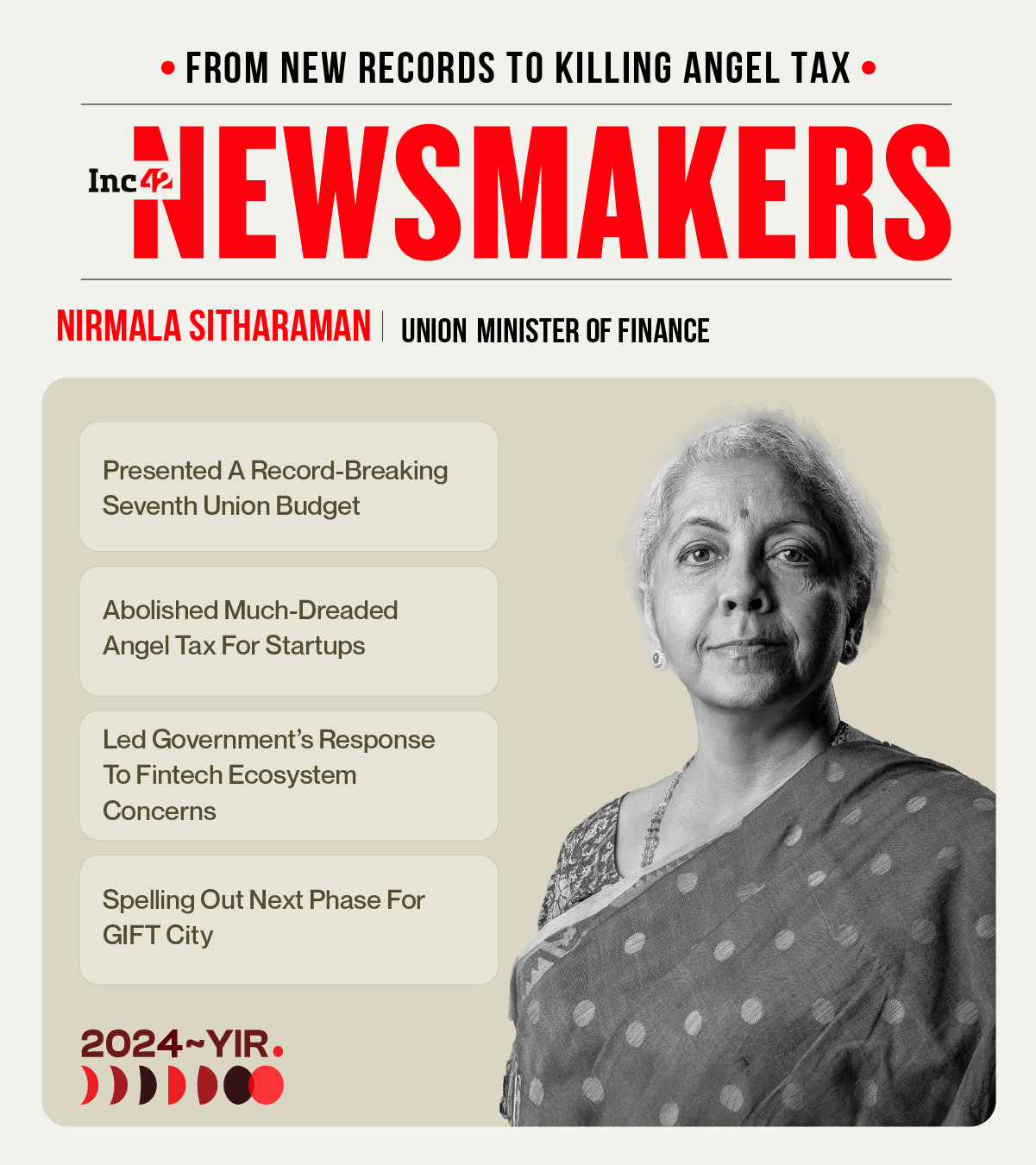
In what was perhaps the biggest news for the Indian startup ecosystem this year, the incumbent finance minister Nirmala Sitharaman finally put an end to the startup angel tax earlier this year. Incidentally, that was also a record-breaking seventh Union Budget presentation for the finance minister, who has seen the startup ecosystem evolve over the past two governments.
The startup ecosystem collectively breathed a sigh of relief with the end of the angel tax and Sitharaman’s commitment to solving pending cases as well.
Besides the tax abolishment, Sitharaman epitomised the government’s stance on key issues concerning GST on online gaming or further clarity for the cryptocurrency space. It would be interesting to see what the next budget in February brings for the startup ecosystem. As usual, as we step into 2025, all eyes will be on Sitharaman once again.
Nithin Kamath: Making Sense Of Market Regulations
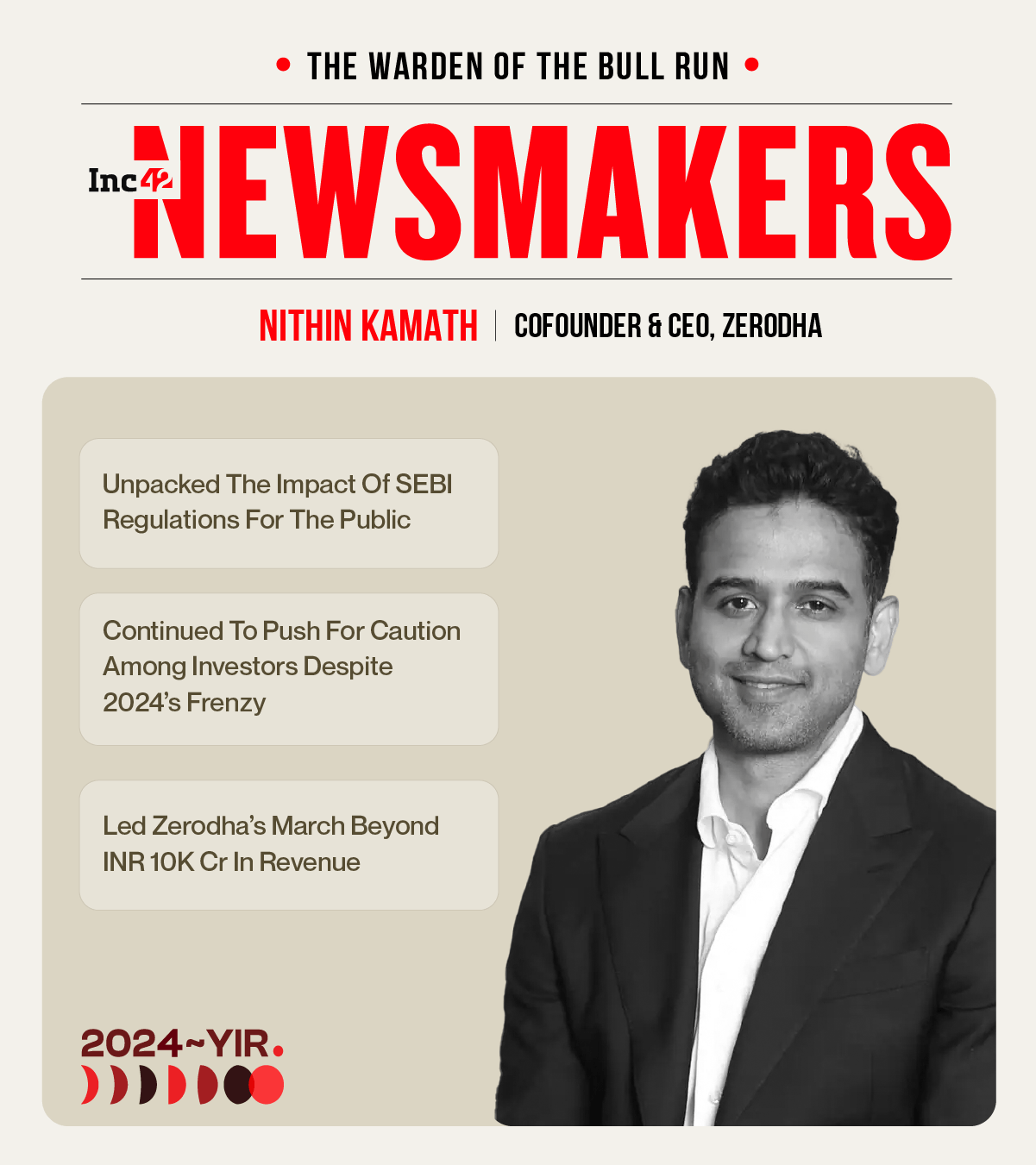
Want to make sense of the changes SEBI brought in for stock exchanges and investment platforms this year? There’s perhaps no better place to unpack these than on Nithin Kamath’s social media pages.
Like in the past, one could count on Kamath to deliver an absolutely unbiased take on all matters related to investments.
For instance, after SEBI barred trading platforms from giving discounts to high-volume users in July, Kamath spoke about how this might influence the zero brokerage structure adopted by many platforms.
SEBI’s scrutiny on the future and options trading desks threatened to disrupt the models of many discount broking platforms, but how big could this disruption be? Kamath was transparent enough to explain that this meant a 30% hit for Zerodha alone, and perhaps more severe for others.
Piyush Goyal: Fostering Cohesion In Indian Startups
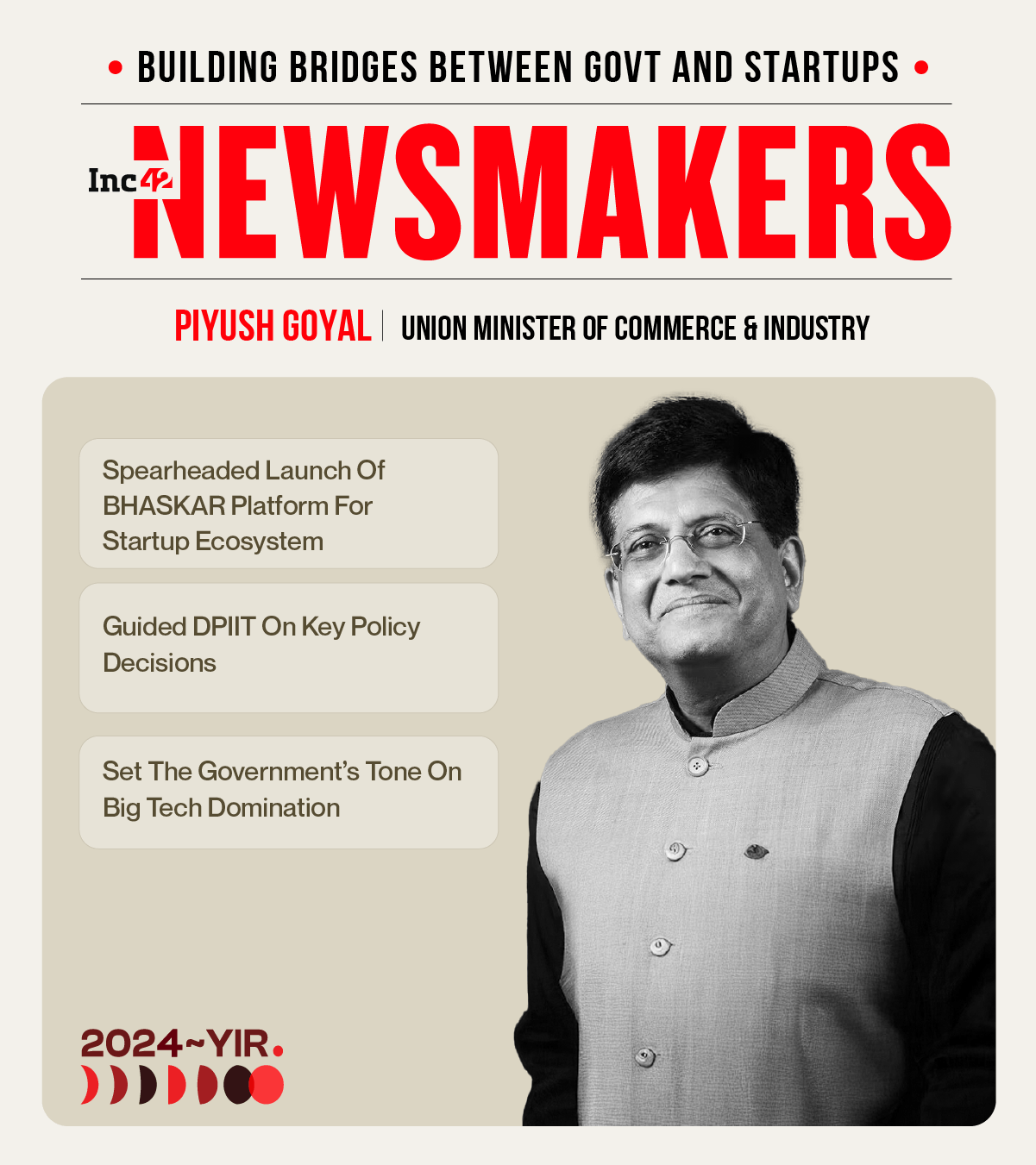
The Ministry Of Commerce & Industry governs the all-important DPIIT, which is effectively setting the pace for several key issues pertaining to the growth of startups and attracting investment for the Indian ecosystem.
From the Startup Mahakumbh to the launch of BHASKAR, the ministry under the leadership of Piyush Goyal addressed and delivered on some of the pain points of the ecosystem.
BHASKAR or the Bharat Startup Knowledge Access Registry will effectively open up the lines of communication between startups, investors and most importantly, the government.
Bringing the ecosystem together may be just one part of the startup equation in the minister’s plans. Goyal’s long term vision to build an Indian ‘Silicon Valley’ as well as a section 8 company, which will constitute participants from all stakeholders in the ecosystem.
Ritesh Agarwal: Spearheading OYO’s Turnaround
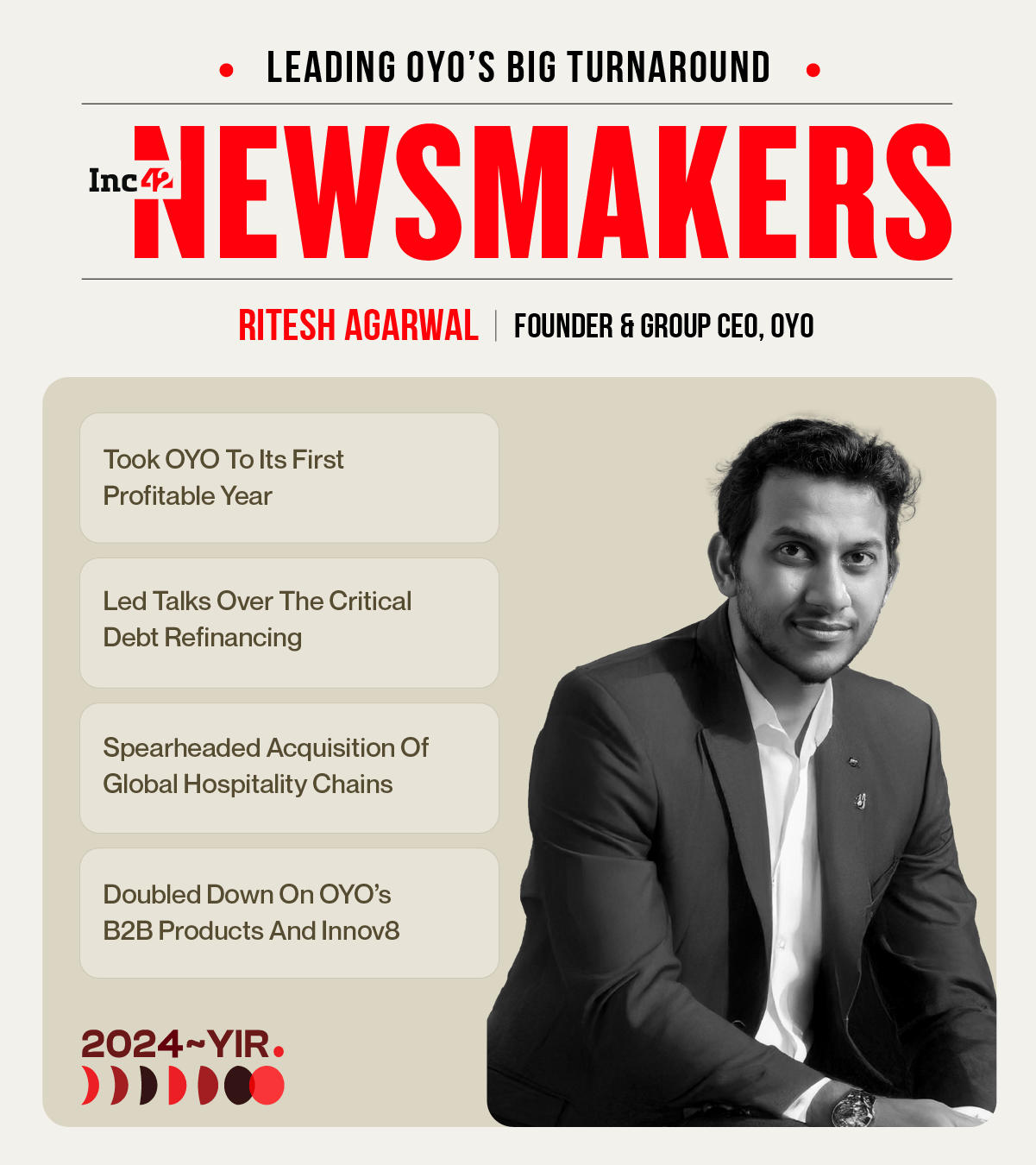
It was the year when OYO turned profitable, and also made big acquisitions to expand its global footprint.
Like Deepinder Goyal, Ritesh Agarwal also stepped into the Shark Tank India spotlight and demonstrated his penchant for backing entrepreneurs that don’t fit the mould. While Agarwal’s reputation as an entrepreneur was built around disrupting the hospitality industry, the TV appearance showed that he’s also thinking like the investors that backed OYO when it was just an idea.
Speaking to Inc42, he had said that the appearance on Shark Tank does not stem from his desire for personal fame but from his desire to capitalise on the opportunity to connect with and support India’s vibrant entrepreneurial ecosystem.
With profits now rolling in for the business, Agarwal has set its sights on more lucrative markets in the US and in Europe with large scale acquisitions. In this regard, a key move was Agarwal buying back stake in the startup, and engaging with financial institutions to restructure OYO’s debt and getting it ready for a potential and much-awaited public market debut.
Shaktikanta Das: Passing The Regulatory Torch
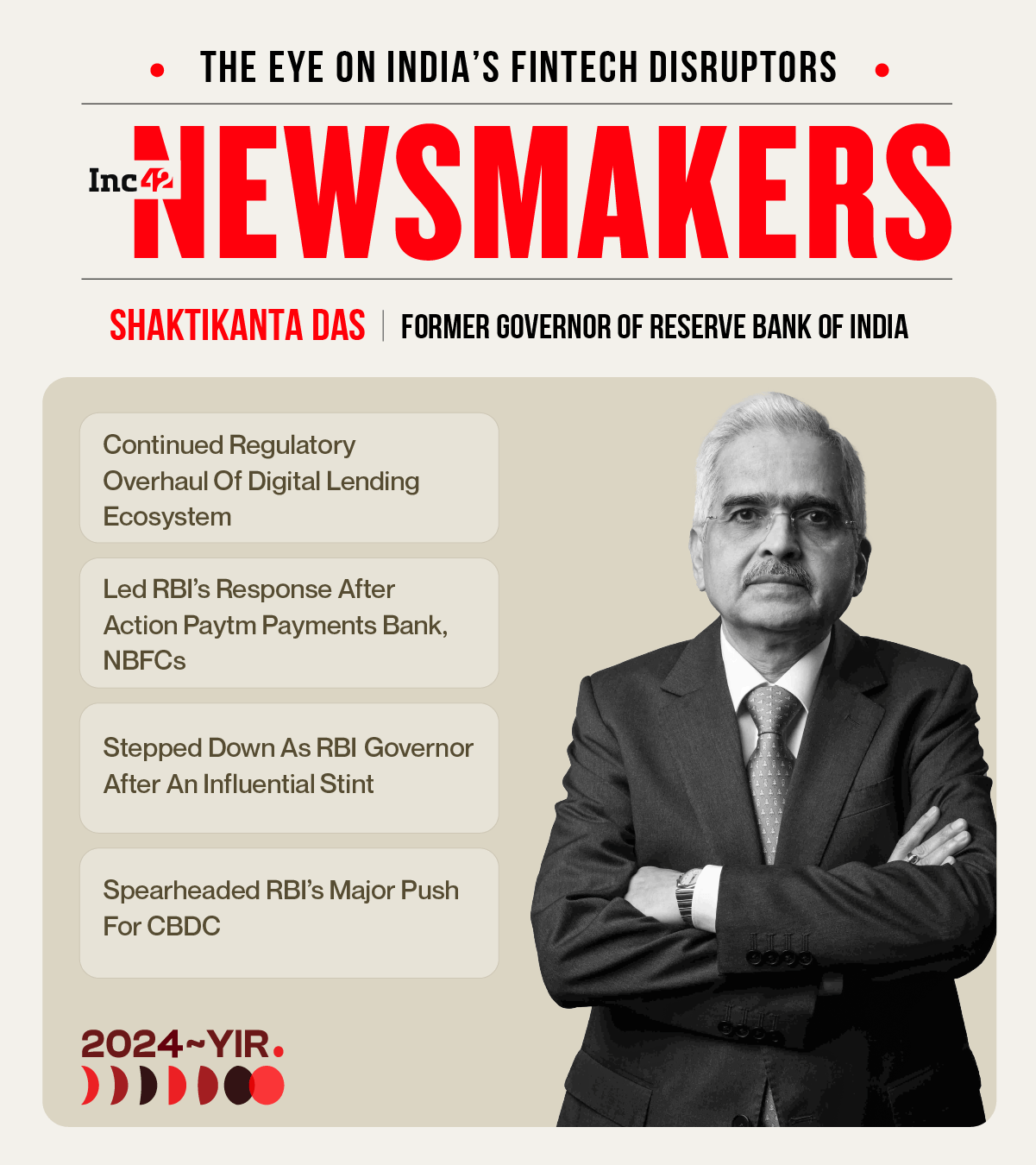
With the world’s third largest fintech ecosystem continuing to grow leaps and bounds in 2024, there’s always a whole lot of responsibility that comes with governing this sector. In his last year as the RBI governor, Shaktikanta Das ensured that the regulator went beyond this responsibility and cleaned up segments such as digital lending, NBFCs, payments banking and more.
In particular, Das took the heat for striking the regulatory gavel on Paytm Payments Bank, as well as NBFCs such as Navi Finserv, and DMI Finance. To his credit, Das never showed signs of relenting to industry’s requests and kept his focus on building a robust fintech ecosystem in India.
Meanwhile, Das also oversaw NPCI’s roll out of Credit on UPI, paving the way for building a tech-first low-cost model for financial institutions to acquire loan customers and disburse loans faster.
Das was also outspoken about the economic harms of volatile cryptocurrencies, which are stuck in something of a regulatory limbo, but the RBI’s push for the Central Bank Digital Currency (CBDC) indicated that perhaps the tide is slowly turning in this regard.
Vijay Shekhar Sharma: Navigating Choppy Waters With Paytm
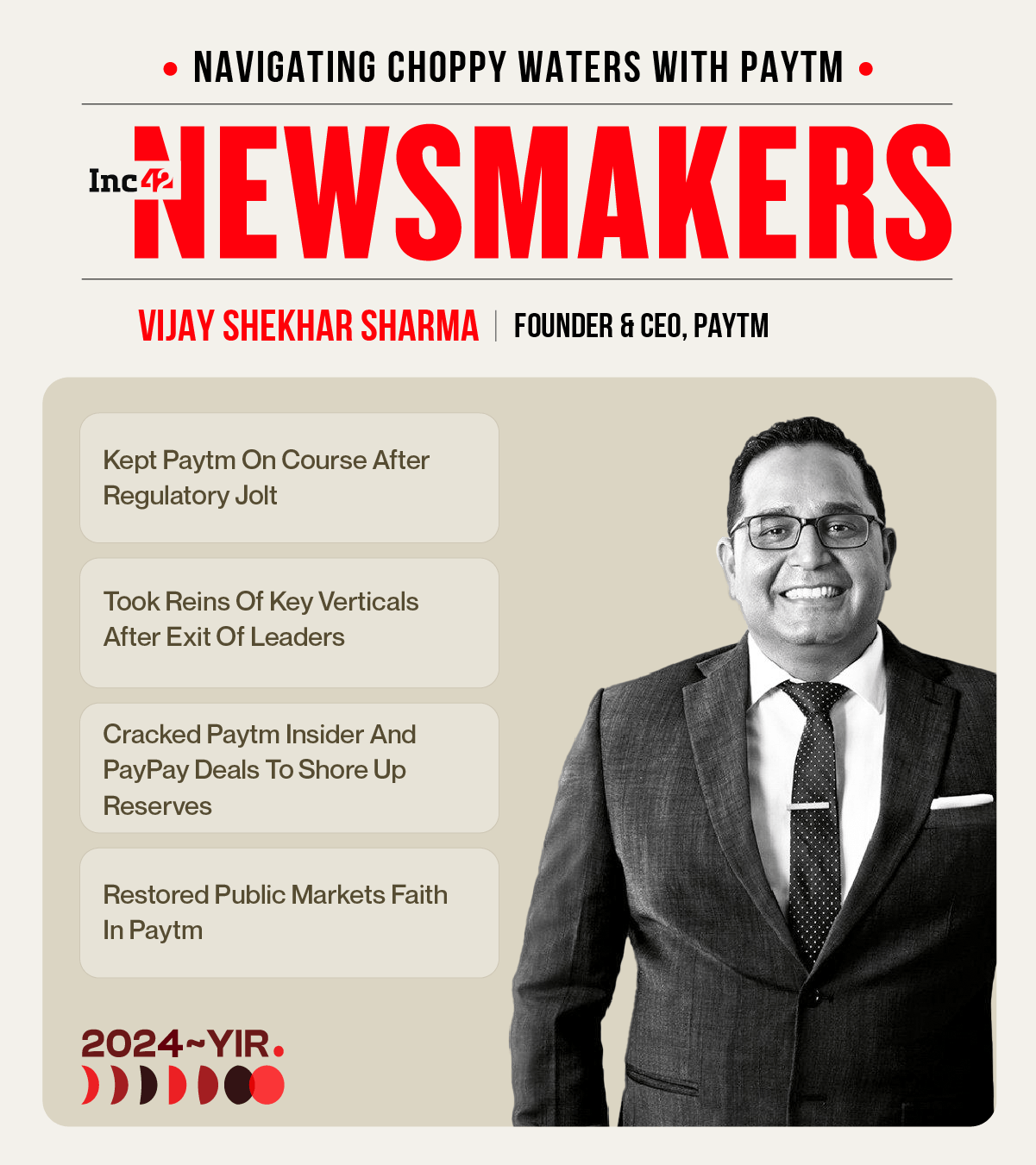
For Vijay Shekhar Sharma, this year was all about answering tough questions.
With Paytm’s banking operations shut down in the beginning of the year, the CEO was faced with a barrage of questions and concerns from shareholders and customers. Besides this, an exodus at its top deck also clouded the fintech’s future, where Sharma had to step in and take charge of key products and verticals.
With all eyes glued on what’s next for Paytm, Sharma turned the spotlight on Paytm’s efforts to reduce costs through AI and layoffs, grow top line revenue through a focus on consumer payments, and the sale of Paytm Insider and Paytm’s stake in PayPay towards the end of the year.
The outspoken entrepreneur’s remarks at different public forums, including criticism of Paytm’s IPO bankers, also grabbed headlines.
Of course, there are still many questions that Sharma and Paytm still have to answer in the year ahead. While profits have come as a result of the Zomato-Insider acquisition deal, the challenges on the business front persist, with competition also looking at the same areas that Paytm is targeting.
(Edited by: Nikhil Subramaniam)